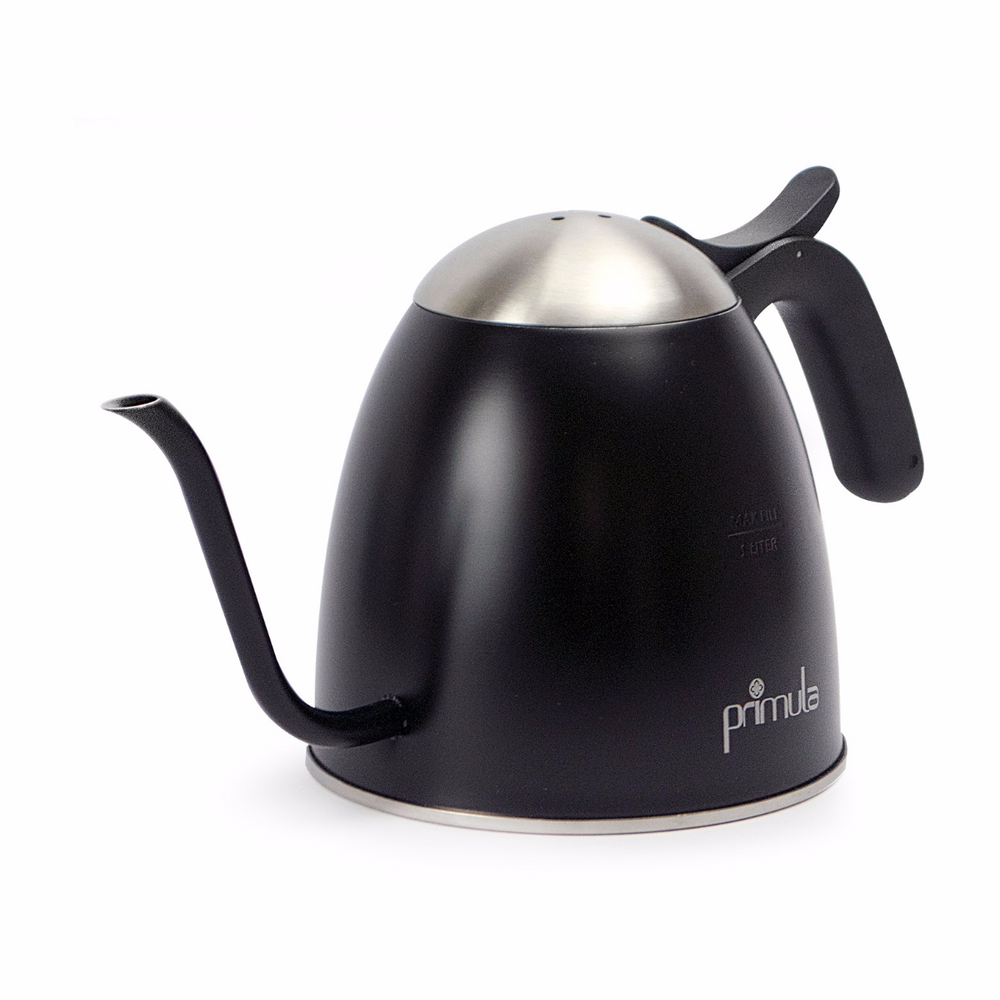How to Make Pour Over Coffee: The Complete Beginner's Guide
Updated for 2021. Pour over coffee receives a certain reverence from the coffee world that other brew methods like French press do not. It’s quintessentially hipster, and as a result, more likely to be misunderstood by the general coffee drinking populace. On a spectrum of time consumption and user involvement, pour over coffee is about as complicated as it gets, especially when compared to something like automatic drip coffee AKA filter coffee. It’s easy to understand how the average coffee drinker would be put off by the idea of investing so much time and energy into brewing a cup of coffee. But, people do!
Before we delve too deeply into this topic, it’s important to emphasize that pour over coffee is not a monolith, and by that I simply mean that there are a wide variety of styles, techniques, and equipment available to brew it. As a brew method, pour over gives us direct control over the extraction of our coffee as we are able directly control the brew temperature, grind size, and most importantly flow rate when brewing. By controlling these variables, we are able to influence the contact time between the water and our grounds, and ultimately the amount of “stuff” that we’re able to extract from our coffee. If I’m losing you, simply put, you can make your coffee taste the best it possibly can.

Grind Size by Coffee Brewing Method
What is Pour Over Coffee?
Pour over coffee is a manual brew method that involves pouring hot water over ground coffee that then flows through a filter and into a carafe or other serving vessel. Manual brewing is simply when a method requires manual involvement from a person to facilitate it. With pour over, you’ll heat your water separately, grind your coffee (unless you’re using pre-ground), and pour the water. Pour over coffee is considered by many to be an “artisan” brew method, meaning that the quality of the coffee produced will be of higher quality than you would typically get from an automatic method. With that distinction in mind, the techniques and recipes we will suggest in this guide will assume that you’re using freshly roasted coffee within 1-2 weeks of its roast date.
As a brew method, pour over is a bit more like espresso in the sense that your mistakes are more readily apparent for a number of reasons. The first is that everything you’re doing is visible to you, if for instance your flow is too fast or too slow, you’ll know immediately as you’ll be able to observe it happening in real time. Additionally, if you’re taking the time to set your water temperature, dial in your grind, and are timing your extraction, it’s likely that you’re applying much more scrutiny to your result than if you pushed a button and coffee appeared in front of you.
How to Make Pour Over Coffee

Pour Over Coffee Filters
Depending on the type of brewer that you’re using, the type of filter that it takes will vary. The two big pour over manufacturers, Chemex and Hario have their own proprietary design that are compatible with their brewers. These filters will influence the resulting coffee in your cup so it's worth it to research the dripper and the characteristics of its coffee before making any decisions on what to purchase. Other devices like the E&B Lab drip flowers are compatible with multiple filter types, while others like the V Style drippers from Bonavita are compatible with regular drip coffee filters.
Pour Over Brewing Ratio
The ratio of coffee to water that you use for brewing pour over coffee will fluctuate based on the type of brewer you’re using, the capacity, and most importantly, your preference. When starting out, we recommend following a standard ratio of 60g of coffee to 1L of water until you’re comfortable enough to start deviating from this formula. 1 liter is equal to approximately 4 US cups, a US cup being 8 fluid oz. In exact measurements, that’s 4.22675 cups to be precise. So, if we do a bit of division, this ratio shakes out to about 14.2g of ground coffee per 8oz cup. Again, you’re free to add or subtract water or coffee to your liking, but our recommendation is to try this ratio if you’re just starting out.
Pour Over Grind Size

Similar to the filters, the grind size for your pour over device will depend on the type of pour over equipment that you’re using. As a general rule, the grinding range for pour over devices will range from slightly finer than your typical drip coffee grind for methods that require more resistance from the grounds themselves to more coarse for methods like Chemex where the filter paper is so thick that it impedes the flow of your coffee.
The most important thing is having a grinder that can make meaningful adjustments to your grind size by offering a suitable range of grinds to switch between. You also want consistent particle size distribution so you don’t have channeling. For anybody looking to get serious without breaking the bank, we strongly suggest the Baratza Virtuoso+ as a contender for pour over grinding.

$359.99
Pour Over Coffee Makers
Bonavita
V Style Dripper #4
Bonavita’s V-Style drippers are handy devices that make it easy to brew pour over coffee for one or more people at a time. The one-piece bone China design makes the V Style Dripper great for heat retention as there are no individual components that can act as heat sinks. Another convenient feature is that the dripper uses regular #2 and #4 coffee filters depending on the size you choose, so it’s easy to find replacements when you’re running low. When brewing the ribbed design of the walls help to direct water downward toward the center of the dripper.
Chemex
Classic 8 Cup
The Chemex is a popular pour over dripper that is known for its thick paper filters that produce what people commonly describe as an incredibly clean cup of coffee. The flat walls of the Chemex do less to direct the flow of water than ribbed walls and the filter paper will stick directly to them. Coupled with the thick paper, this means that the grind for a Chemex will generally need to be more coarse in order to allow water to flow properly. The beauty of the design lies in the combination of the brewer and carafe, meaning that the Chemex is a two-in-one device for both brewing and serving coffee. Take you pick of the elegant glass handle or classic wood and leather style.
Hario
V60 02 Glass / V60 02 Ceramic / V60 02 Metal
Hario’s V60 is the quintessential pour over dripper with a cone shaped design and a series of internal spiraling ridges that direct the flow of coffee downward. All of the V60 drippers use a proprietary paper filter from Hario that produces a rich cup of coffee. Designed for use with both dripper stands and single cups, the beauty of the V60 is in the variety of materials that are available to choose from.
Glass
The traditional glass V60 is the most basic, featuring a glass cone with a plastic handle that can be removed for easy cleaning or placement inside varying drip stands.
Ceramic
The ceramic V60 essentially combines the benefits of a one-piece ceramic design with the design of the cone shape and internal ridges. As a single unit made entirely of ceramic, it holds heat very well, although it is also more breakable than the glass version as the handle is attached directly to the dripper.
Metal
The metal V60 is a stainless steel variation of the glass dripper, featuring the same form factor and internal ridges as the other styles. Stainless helps retain heat, but you will want to make sure it is preheated well before brewing. It goes without saying that this is the most durable version of the V60 available.
Woodneck Drip Pot
A unique entry from Hario on our list is the Woodneck Drip Pot which uses a cloth filter, sometimes known as a “sock” to filter coffee. When brewing with one of these types of filters, it will be more similar to a Chemex, owing to the cloth filter trapping far more oils for a much cleaner cup of coffee. The drip pot is a great conversation piece with beautiful wood and leather components and it eliminates paper waste with its reusable filter. That said, you want to take extra care to completely clean the filter after every use to prevent the buildup of coffee oils and grounds inside of the fabric. You also want to make sure to dry the filter thoroughly.
E&B Lab
Flower Dripper V60/Chemex/Wave
Made by E&B Lab, a division of the IMS company that is dedicated to crafting high end manual brewing devices that are made in Italy, these flowers are some of our favorite pour over drippers. These uniquely designed stainless steel flowers are compatible with both Chemex and Hario filters, allowing you to take your pick when it comes to brewing in your preferred style. Alternatively, a separate flower designed for use with Wave filters is also available. These are fairly minimalist drippers and have very limited contact with the filters, meaning that they will not rob much heat from the water, nor will they heavily influence the flow of water. They look best when paired with an E&B Lab drip station.
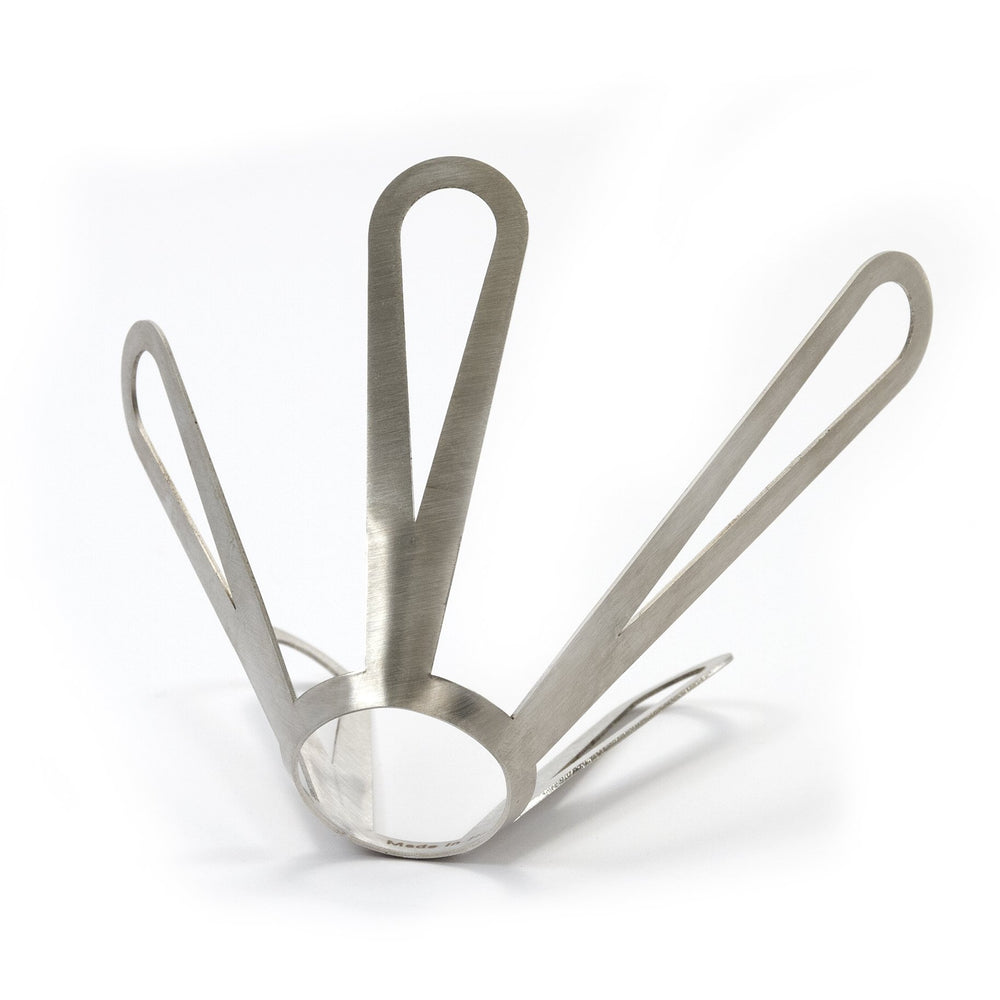
$54.99
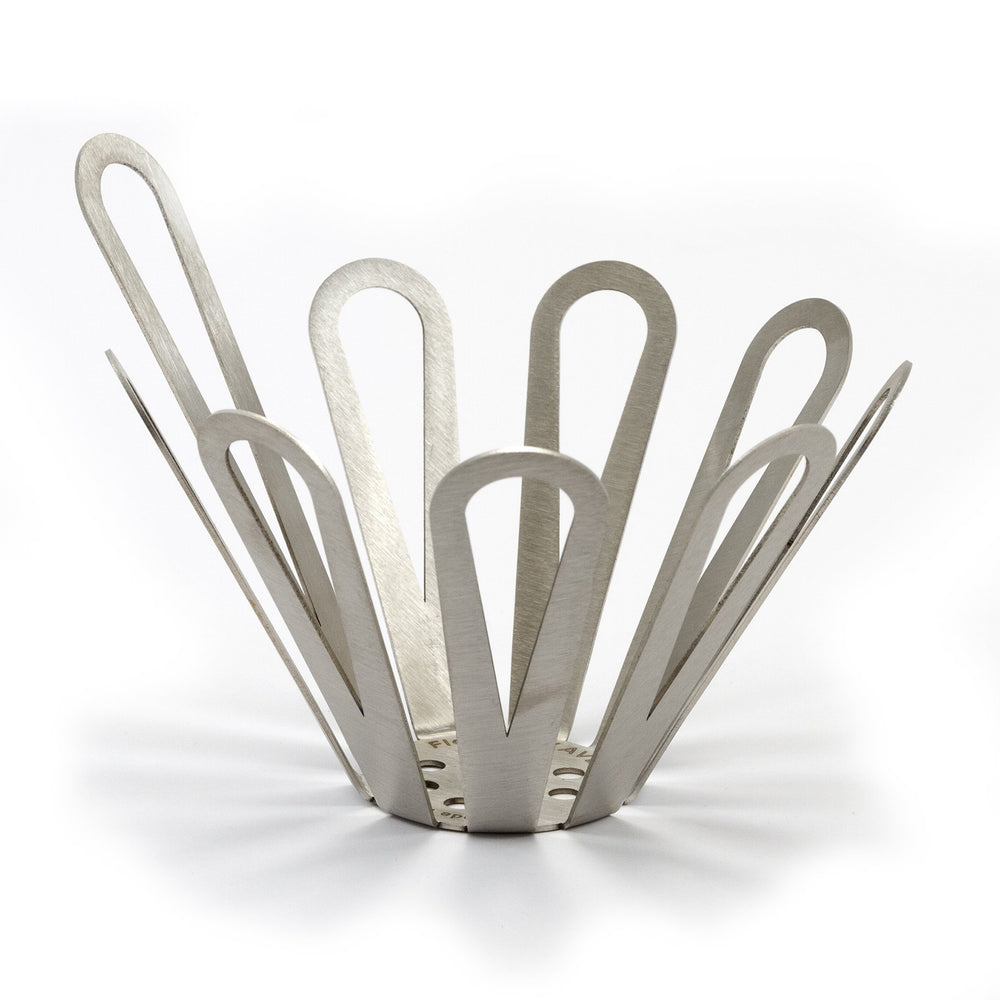
$54.99
Dripper Cone and Stand
The only cone filter to make an appearance on this list, E&B Lab’s Dripper Cone and Stand is a two-in-one device that combines a pour over brew stand with a filter cone. This design allows it to comfortably sit on top of cups, brew stands, or carafes, allowing it flexibility when it comes to integrating into your brew setup. Additionally, the dripper cone can be detached from the stand via three nuts which hold it in place, allowing you to adapt it for use in brewers like the Chemex.
Compared to other methods, the stainless mesh will generally provide less resistance than a paper filter, meaning that you will want to grind a bit finer than you typically would in order to maintain a similar flow to what you’d expect from a paper filter. For best results, you’ll want to make sure that you clean the screen regularly to prevent the buildup of grounds and coffee oils. In the event that they do build up, a rinse in a solution of hot water and Urnex Cafzia will work wonders.
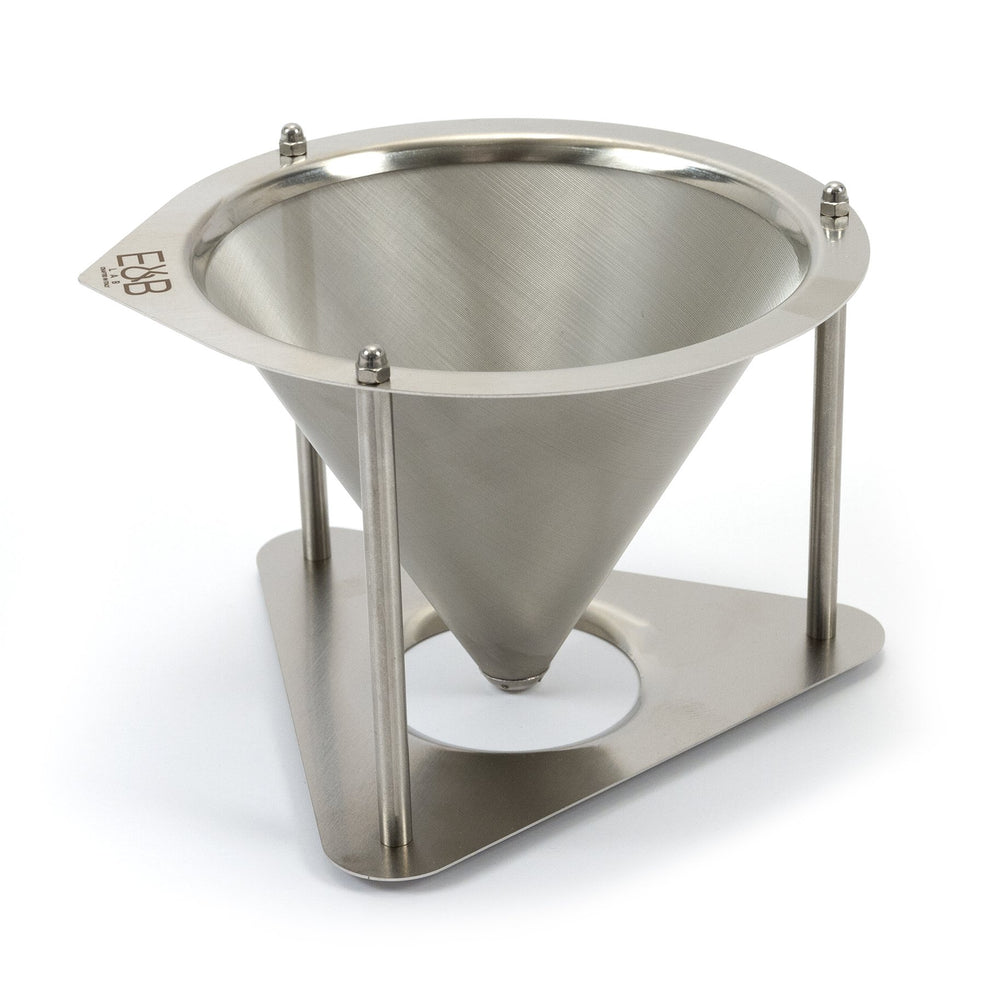
$79.99
The Best Pour Over Coffee Kettle
Because you’re going to be pouring hot water over your coffee to brew, you will need some kind of vessel (most commonly a kettle) to heat and pour it. When it comes to successful pour over brewing, you want to be able to control the flow of water to maintain a constant rate and depth of water inside of your dripper. Typical kettles typically have standard spouts and they are better suited for use with something like loose leaf tea or a French press.
For pour over coffee you’ll want to use a gooseneck kettle to control the flow of your water. Gooseneck kettles take their name from the long, slender spout that connects to the base of the kettle. The length of the spout makes it much easier to control the flow of water as it has a much greater distance to travel. As a result, this design has become the preferred style for brewing pour over coffee. From there, we can divide gooseneck kettles into two categories, stovetop and electric.
Stovetop Kettles
A stovetop kettle is a manual kettle that is heated by an open flame or other type of stove. Typically, these are the most affordable styles of kettles and they are great for starting out. Advantages of stovetop kettles are their low price point, durability, and simplicity. There are no mechanical or electrical components that can fail, so these kettles are in it for the long haul! When brewing with one of these types of kettles, it is helpful to purchase a separate thermometer in order to avoid burning your coffee and to aim for 200°F ± 2° before brewing.
-
The Primula Precision Pour Over Kettle is ergonomic, sleek, and offers precision pouring for delicious pour over.
Electric Kettles
Electric kettles use heating elements to heat water for brewing. Depending on the style of kettle, they may simply boil the water, though most offer the ability to program your desired temperature or to heat to preset temperatures. These types of kettles are the most predictable and easy to use when it comes to getting repeatable results while brewing. You don’t have to worry about the water getting too hot in programmable kettles and they are often coupled with timers to help with achieving proper brew times.
Electric kettles are more complex and more expensive than stovetop kettles, meaning that they offer a higher barrier to entry, and must be maintained more delicately. Kettles can build up limescale on the inside which can interfere with the temperature probe. Regular descaling will help to ensure that your kettle is functioning at 100%.
Pour Over Coffee Scales
Having the right tools for the job is one of the most important aspects of coffee brewing, and pour over is no exception. Following brew recipes is an important part of achieving consistent in-cup results with any form of coffee preparation, but with pour over it’s even more important. When brewing pour over coffee, not only do you need to be aware of the amount of ground coffee and water that you brew with, but you also need to keep track of your total brew time and your flow rate. Part of the equation is pouring specific amounts of water within a certain time frame, so using a scale that tracks both weight and time is essential for achieving best in-cup results.
When it comes to specific pour over scales, we’re pleased to offer options from both Acaia and Hario that we’ve outlined for you below:
Hario V60 Drip Coffee Scale/Timer
The most affordable, dedicated pour over scale that we sell is the V60 Drip Coffee Scale/Timer from Hario. As its name suggests, this scale is designed to accompany Hario’s V60 pour over dripper and is compatible for use with their Acrylic Drip Stand. The scale is accurate within 1/10th of a gram and features a built-in timer to time your pour with weight and time displayed on a plain text LED. The weighing surface is wide enough to accommodate a variety of brewers including a Chemex and a French press, although its plastic construction requires a bit more delicacy to avoid damaging. The scale takes a pair of AAA batteries to operate, and includes 2 in the box.
Bonavita Rechargeable Auto Tare Gram Scale
A handy scale from Bonavita, the Auto Tare Gram Scale is accurate within 0.1 grams. Like the V60 scale, it features a built-in timer, but ups the ante by including rechargeable batteries and a USB charging cord. The circular weighing surface measures roughly 5” in diameter and features a nano-coating to protect against water damage. The auto-tare function can toggled on and off, and the scale also has an auto-off feature that can be set to shut the scale off automatically after 60, 120, or 180 seconds of inactivity. This feature can alternatively be deactivated so that the scale will stay on indefinitely.
Hario V60 Drip Coffee Scale in Metal
This scale is essentially an upgraded version of Hario’s regular V60 scale, with the key differences being the updated stainless steel weighing surface and the cleaner LED text which displays both your weight and time. The scale is accurate within 1/10th of a gram and takes the same AAA batteries to operate. It has the exact same form factor as the standard V60 scale and is also compatible with the drip stand as well.
Acaia Pearl Coffee Scale
The product of Kickstarter and a lot of passion for coffee brewing, the Pearl is the first scale from Acaia, that impresses with both its features and its form factor. The Pearl features a very no-frills approach to design with a clean weighing surface that wraps around the edge of the scale. Soft LED text displays both weight within 0.1g increments and time within seconds. Compared to the Hario, the Pearl features numerous improvements including 20ms response times, a 20-30 hour rechargeable battery, bluetooth connectivity to the Acaia App, and 6 different operating modes. The Pearl’s weighing surface is large enough to comfortably accommodate both pour over devices and French presses alike.
Acaia Pearl S Coffee Scale
Acaia developed the Pearl S to build upon the success of the standard Pearl while reorienting the scale for use as a pour over specialist. The Pearl S now features a real-time flow-rate display to show flow, time, and weight all at once, a feature that’s a huge plus for precision pour overs. Just like the Pearl, the Pearl S measures in 0.1g increments and time within seconds. The screen has been updated with an LED dot matrix display that has been optimized for visibility in different lighting. New modes such as pour over coffee practice mode, portafilter mode, and connectivity to Acaia’s coffee brewing guides via the Brewguide app make the Pearl S the perfect choice for anyone looking to take their pour over to the next level.
Pour Over Coffee Stands
With pour over coffee, logistically you’re pouring water over your grounds and brewed coffee then flows down into a carafe or cup. Depending on the type of dripper that you’re using, it may need to be suspended above your serving vessel. Enter the pour over stand. These stands are devices that hold your dripper above your carafe for brewing. They are available in a variety of styles and materials, with some being compatible with other accessories like scales, and others being strictly aesthetic.
Hario Drip Stand for Metal V60 Coffee Dripper
The most basic drip stand on our list, Hario’s drip stand for the V60 dripper is a standard metal arm that holds your dripper above the mug or carafe below. The base of the dripper is made from soft silicone to securely hold your vessel and can be removed for easy cleaning. This versatile stand is compatible with Hario’s glass and metal V60 drippers in size 01, 02, and 03.
Hario V60 Clear Acrylic Drip Stand
Designed to be used in tandem with the V60 scale, this lightweight acrylic stand allows you to weigh your pour while more securely holding your V60 and carafe. The large drip tray has a stainless cover and is removable for draining and cleaning. This flexible stand is compatible with all styles of Hario V60 drippers.
Bonavita Porcelain Pour Over Coffee Dripper Stand
Similar to the metal drip stand from Hario, Bonavita takes a simplistic approach to this dripper stand, featuring an elegant porcelain base with a drip tray, and a lengthy steel arm with an adjustable dripper ring. The clever pinch grip design allows you to raise and lower the height of the ring to accommodate cups and carafes of various sizes.
Hario V60 Single Stand Olive Wood
Made of elegant olive wood, this drip stand is fairly no-frills, and simply holds carafes and drippers in place for pouring. This beautiful stand is compatible with all styles of the V60 02 and 03 drippers.
E&B Lab Drip Station - Stainless Steel

$119.99
Crafted in Italy by E&B Lab, their stainless steel drip station is the perfect solution for anyone looking for a functional and modern pour over station. Comprised of a one-piece steel frame, finished wood, and a removable drip tray, the E&B Lab drip station can accommodate a wide variety of pour over drippers, including E&B’s drip flowers and cone. The drip station is also capable of supporting Aeropress brewing, adding greater flexibility to its design.
Pour Over vs. French Press
If you’re looking to get a bit more hands-on with your coffee brewing, it makes sense that you might consider both pour over and French press coffee. If you haven’t already, we suggest you take a look at our French press brewing guide to get a better idea of what you’re signing up for. If you’re sticking around let’s get into what distinguishes these two methods from one another:
1. French Press is Easier to Brew
This first distinction is an important one because it outlines one of the key differences between these two methods. A French press is a type of immersion brewer, which simply means that the coffee is immersed in water and is steeped like tea. As a result, brewing with a French press requires less user intervention because all of the coffee is coming into contact with the water for the same amount of time, whereas pour over requires that you control your flow and evenly pour water over your bed of grinds. Apart from stirring your grinds to ensure even saturation, there’s not much more to do apart from waiting for your coffee to finish steeping.
2. French Press Coffee is More Full-Bodied
While there may be the occasional exception to this rule, French press coffee will typically be more full-bodied than pour over coffee. The reason for this is that the wire mesh filter screen used in most French presses will permit far more of the oils that are emulsified from the grounds to stay in your cup. Most pour over brewers use paper filters of varying thickness that will trap these oils, resulting in what some describe as a “cleaner” cup of coffee. By comparison, the French press produces characteristically rich coffee.
3. Pour Over Offers More Variety
French presses are available in a few different materials, shapes, and styles, but generally they will all produce a very similar cup of coffee. With pour over, there are a wide variety of brands and styles of drippers and filters that can have a major impact on the coffee you brew. A Hario V60 will produce a different style of cup than a Hario cloth dripper, which is different from a Chemex, which is different from a Yama. You get the idea. Once you’ve got your hands on a grinder, a pour over scale and a kettle, you have everything you need to try brewing with the different style of drippers available.
Pour Over vs. Drip Coffee
As we discussed above, pour over and automatic drip coffee exist at two completely opposite ends of the brewing spectrum. While you can use a similar ratio of coffee to water for brewing, and the same temperature for extraction, the primary difference between these two brewing methods has to do with the user involvement as opposed to any tremendous change to recipes. The thing about pour over coffee is that you are directly in control of the flow of water, meaning that you are influencing contact time directly. However, some companies including Chemex produce automatic drip coffee makers that allow customers to put a pour over device underneath the shower heads.
While this may be a novel idea, it still isn’t true pour over as the ability to control your pour is absent, and the flow rate will be determined by the flow of water through the shower head. That said, it still allows home baristas to take advantage of the characteristics of pour over drippers such as the V60 for its spiral design, or the Chemex for its incredibly thick paper filters to influence extraction. Another example of a drip brewer that can accomodate pour over devices is the Behmor Brazen Plus Coffee Maker which has a removable basket section, creating more clearance for pour over devices underneath the shower.
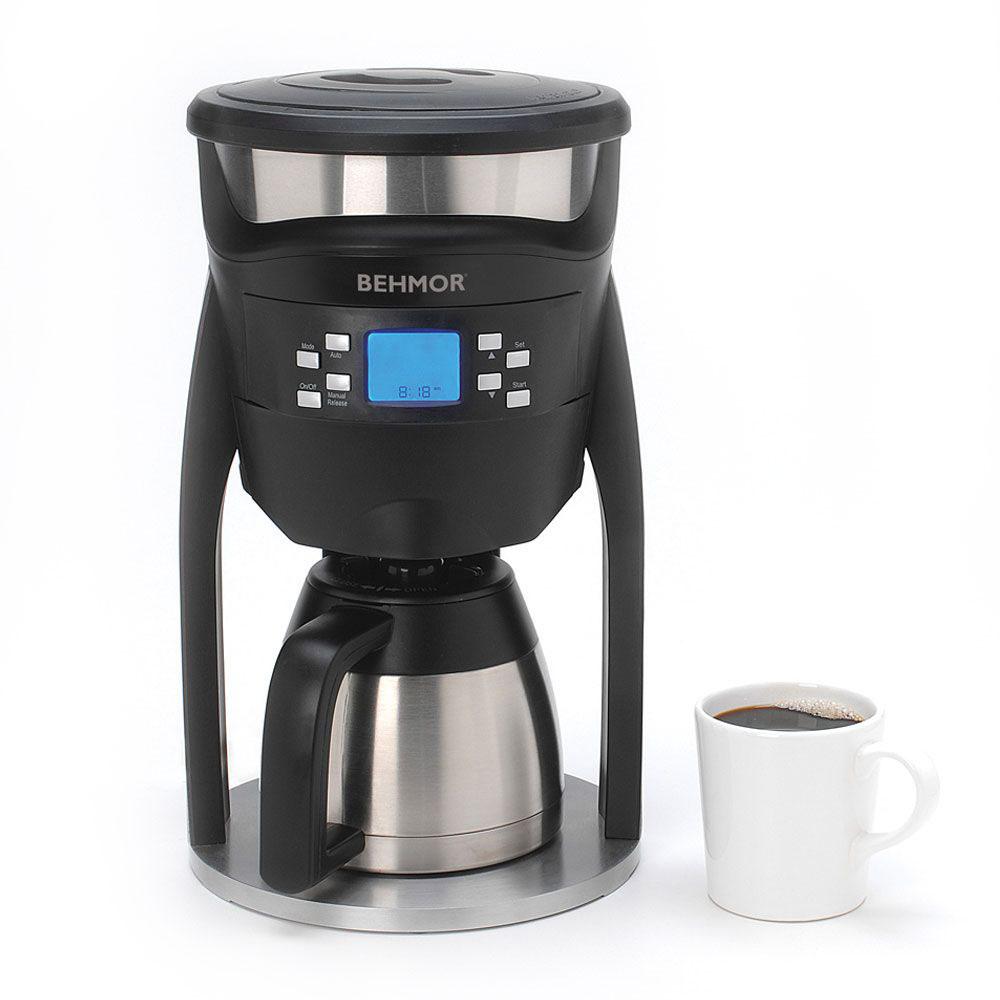
$230.00
Wrapping Up
The general consensus is that pour over is a much more intense and time consuming brew method, but has the potential to yield tastier coffee. People often describe “the ritual” of pour over brewing, meaning the steps involved in crafting a cup of coffee. For some, this ritual can be quite rewarding, and if that sounds at all like you, we definitely suggest that you give it a try!
 Canada
Canada


